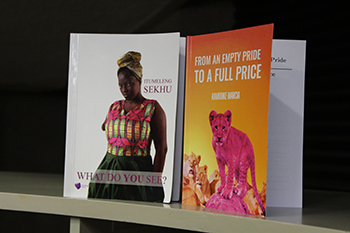Latest News Archive
Please select Category, Year, and then Month to display items
10 March 2022
|
Story Anthony Mthembu
|
Photo Unsplash
 The No Student Hungry team gearing up to start distributing food parcels to the selected students.
The No Student Hungry team gearing up to start distributing food parcels to the selected students.
The UFS is one of the many institutions of higher learning where food insecurity is an active issue. However, the
No Student Hungry Programme is one of the initiatives launched at the university to assist in fighting food insecurity at the institution.
The purpose of the programme
Since its inception in 2011, the initiative has assisted many students in acquiring a healthy meal. Additionally, the Food Environment Office also hands out food packages, so that students can continue to achieve academically. “We are trying to develop a healthy environment for students and make it easier for them to have a nice and healthy meal,” stated Annelize Visagie, who heads the Food Environment Office at the UFS. The Food Environment programme is spread out on all three campuses, each with its own facilitators. Furthermore, the programme mainly caters for students who are not funded by the National Student Financial Aid Scheme (NSFAS) but who are excelling academically. The abovementioned students apply for assistance online, and a list is then drawn up of students who receive assistance for the year.
Alternative solutions to keep the initiative running
On the Bloemfontein Campus, the No Student Hungry Programme will be catering for 200 students in the 2022 academic year, assisting them with a daily nutritious meal. Additional food parcels are also handed out to provide further assistance. “We give food parcels to the students on the list every Tuesday and Thursday at the Thakaneng Bridge,” Visagie highlighted. However, she argues that catering for the student population through this programme can be a challenge, as the demand for assistance is growing rapidly and the ability to assist is limited. The programme relies on partnerships and sponsors to assist the student body. In fact, the coordinators of the programme currently have a memorandum of understanding with Tiger Brands according to which they deliver around 100 food parcels for distribution.
In addition, the coordinators have put in place alternative measures to ensure that they can provide more food to students. “The
Kovsie Act Office, in partnership with the
Department of Sustainable Food Systems and Development, has started a food garden where healthy and nutritious produce are grown, in order to add value to the distribution,” she indicated. Although the programme can only assist to a point, students who are in desperate need of assistance are never turned away. In fact, the
Social Support Unit at Thakaneng Bridge usually assists students with food vouchers for a maximum of four days.
A commitment to teaching healthy eating habits
The programme is not only committed to curbing food insecurity, but also to ensuring that students have a healthy and balanced diet. As such, a booklet is being issued by the
Department of Nutrition and Dietetics in collaboration with the Department of Sustainable Food Systems and Development, which contains ways in which students can make a healthy meal using some of the ingredients offered in the food parcels.
“We want to teach students how to eat healthy in the cheapest way, because they don’t have a lot of money to buy expensive food products,” Visagie argued.
UFS Library book launch programme fosters dialogue between students and authors
2017-03-30

The University of the Free State (UFS) Sasol Library has hosted a series of book launches since 2016, bringing to the Bloemfontein Campus various new and seasoned authors who share their stories with the campus audiences. The Launch Your Book at the Library Programme hosted two authors on 23 March 2017, Itumeleng Sekhu and Marcia Ramodike. Both authors spoke about their life-changing experiences and shared their heart-wrenching stories, filled with courage and hope.
“Libraries must take the lead in creating dialogue, expression of ideas and inculcating a culture of reading and writing. This programme was also established to bridge the gap and find ways to encourage students to read and write, by creating a platform where they can interact with authors and see that people who write books are ordinary people with real stories to tell,” said Marcus Maphile, Assistant Director: Library Marketing and Community Engagement.
Speaking about her book, Itumeleng Sekhu described her experiences from childhood and her life as a disabled person after being severely burnt in a fire accident in her home as a baby. She said: “I tried to commit suicide several times because I had lost hope. Eventually after failing to do so, I realised at some point that it was time for me to let my light shine through.” She wrote her book, titled What Do You See?, which has received substantial media coverage, to encourage others who live with painful experiences, disabilities and what she terms “internal wounds”, hoping that her experiences could help to heal them.
Marcia Ramodike’s book, An Empty Pride to a Full Price, paints a picture of her life as a youth grappling with adult issues. She describes her pain after her mother’s death, and her constant battle with the legacy of the difficult socio-economic conditions she grew up in. When students asked Ramodike what she thought the right time was to write a book, she responded, “today is the right time to write your story”.
The UFS Library has hosted 16 book launches since 2016, with the biggest being the launch of Zubeida Jaffer’s book Beauty of the Heart. The programme aims to provide access to information and to share and debate ideas in support of democracy and freedom of speech.